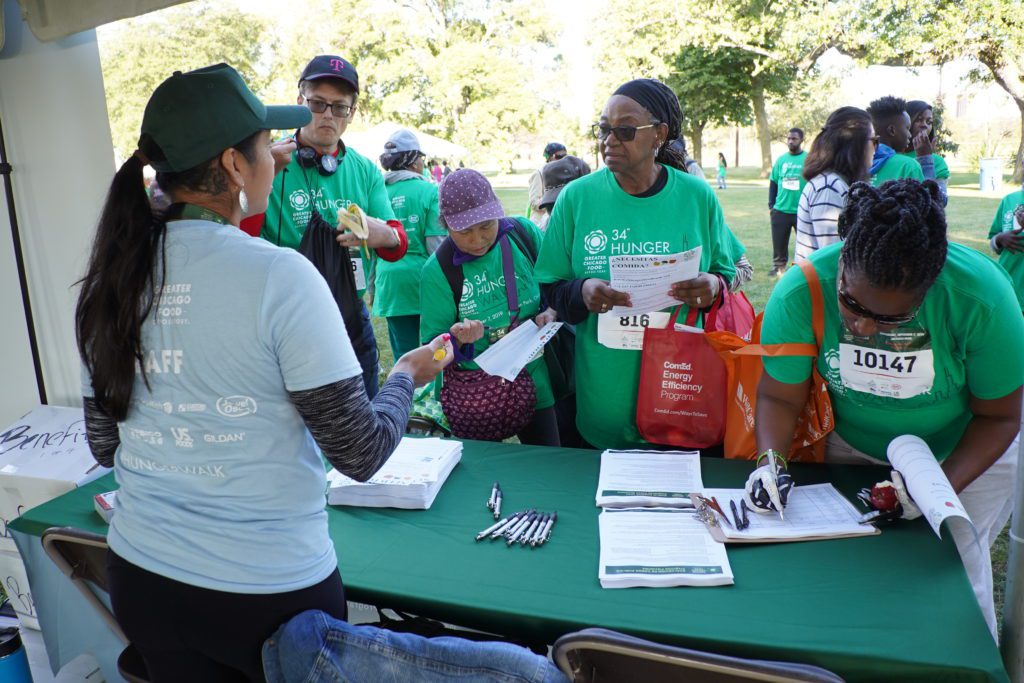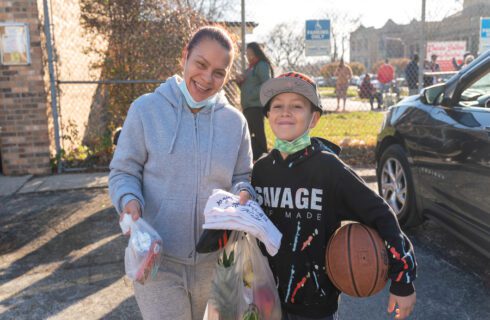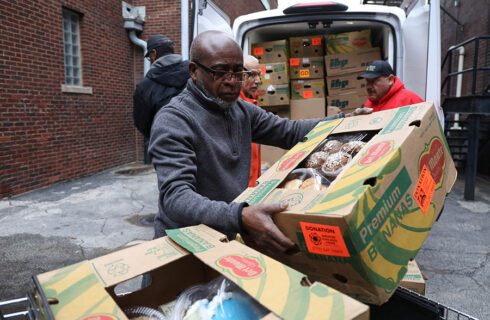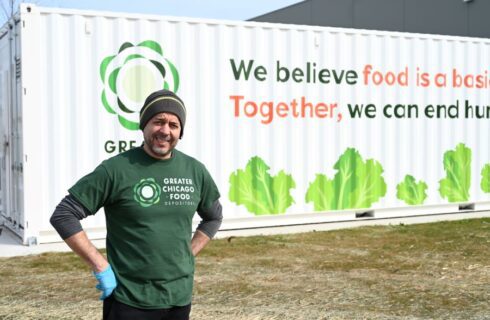As the COVID-19 pandemic continues, more people are facing financial hardship and seeking food assistance, including Supplemental Nutrition Assistance Program (SNAP) benefits, commonly referred to as food stamps.
The Food Depository’s benefits outreach team, which helps Cook County residents apply for SNAP and Medicaid, is serving significantly more people than from pre-COVID days.
“I’ve never seen anything like this,” said Claudia Rodriguez, senior manager of benefits outreach, who has been with the Food Depository for the last nine years.
For the last month and a half, the Food Depository's benefits hotline has received an unprecedented number of calls. For the week ending April 5, the line received 2,275 calls – more than 10 times the amount of calls received (203) for the week ending March 13, which was before the pandemic resulted in the shuttering of businesses and schools.
If you need benefits, visit the Illinois Department of Human Services online application or call the IDHS help line at 800-843-6154.

Claudia Rodriguez, senior manager of benefits outreach
The Hunger Beat recently spoke with Rodriguez to discuss who is facing the greatest need right now and how enrolling in these public programs is changing amid this global crisis. The following interview has been edited for length and clarity.
Q: What would you say to those going through a difficult time right now about the importance of exploring their benefits options?
A: By getting approved for SNAP, it’s one less thing they need to worry about. They can focus on how they’re going to pay their rent and other things, but at least they won’t have to worry about how they’re going to feed their families – themselves and their kids. Even if they don’t want to apply for benefits, but want clarification on SNAP policy or have questions about an existing case, I want them to see us as a resource and know we’re here to help guide them.
Q: What has the benefits outreach team hearing from those looking for help right now?
A: It’s mostly people who have been recently laid off. A lot of clients are calling saying they have children and they don’t have money to buy food for children. We also have clients calling on behalf of their elderly neighbors. Although it’s been really hard to get a lot of calls from clients worried about their own situation, there’s been a lot of calls from neighbors who are taking care of each other, especially worried about their senior neighbors.
We’re also hearing from seniors who want to apply for SNAP. Believe it or not, there’s still a lot of seniors who don’t know about the program or they’ve heard different myths about the program. But now that SNAP has been on the news so much and they’re encouraging people to reach out for help, maybe that is the little push they needed to find out if they’re eligible.
We’ve got a lot of calls, too, from people who are undocumented but have children who are citizens calling to apply. In the voicemails, they say ‘I don’t qualify but my kids were born here, I need food for them.’
Q: For those undocumented community members with children, what are their options for applying for benefits?
A: If you have citizen children or children who are legal permanent residents, parents can apply on their behalf for SNAP. In Illinois, children – regardless of immigration status – are eligible for Medicaid. So they can still apply.
"By getting approved for SNAP, it’s one less thing (people) need to worry about. They can focus on how they’re going to pay their rent and other things, but at least they won’t have to worry about how they’re going to feed their families."
Q: If people need to apply for benefits right now, where should they go and how can the Food Depository help?
A: The fastest way for clients right now to get connected to benefits is applying via the state’s Department of Human Services website using their online application or calling the DHS hotline. The state has closed all of its DHS offices. So they are encouraging people to apply online or over the phone.
But people who may not have access to the internet or not be super tech-savvy, they may choose to contact us. Right now, if someone calls our hotline, we do the application over the phone, then on our end we print it and fax it directly to the state for processing.

The Food Depository benefits outreach team's booth at the 2019 Hunger Walk. Benefits Outreach helps connect Cook County residents to SNAP and Medicaid. This outreach is now being done by phone to support the growing number of people affected by COVID-19.
Q: Given the influx of need, have there been any changes to the state's enrollment processes?
A: Yes. Something the state is doing is they are not requiring in-person interviews (and allowing DHS staff and community organizations like the Food Depository to process applications over the phone). So that is speeding up the process and getting clients connected much faster to benefits.
What the state is doing is for households already on SNAP and households that are applying in May, they are getting the maximum amount of benefits, rather than an amount calculated by the household's income and expenses. It’s dependent on the number of household members (ranging from $198 for a one-person household to $1,164 for a household of 8, with additional benefits added for larger households beyond that).
Households that receive SNAP also have to renew once a year, but what the state did is they extended March, April and May renewals for an additional six months. They automatically get six more months. So it helps the client and also helps the local offices because they can focus on approving new applications versus focus on renewals.
And importantly, the Families First Coronavirus Response Act temporarily suspended SNAP work requirements during the federal emergency declaration. This means that starting April 1, there are no work requirements in Illinois (for able-bodied adults without dependents). Anyone who was going to be affected by this rule, will not be affected during this time. Anyone who lost their benefits because they weren’t able to meet the work requirements should immediately apply.
To apply or see if you qualify for benefits, visit abe.illinois.gov or call the state’s DHS hotline (800-843-6154). To reach a member of our team for application assistance or questions, visit our website or call 773-843-5416.
Share This Post



